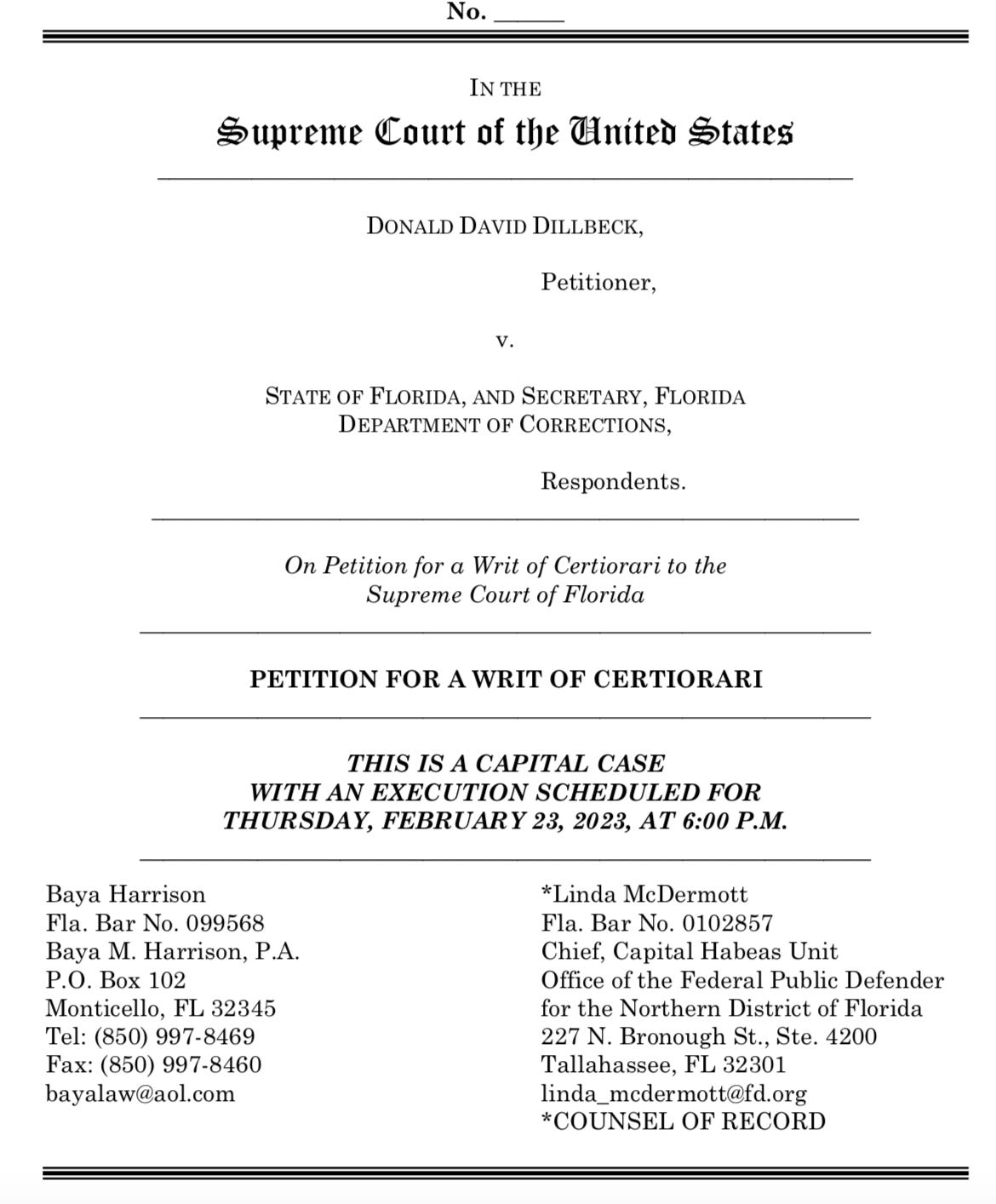Yesterday, Donald Dillbeck filed his petition for certiorari and application for stay of execution at the U.S. Supreme Court. Within hours, the state filed responses to both (response to petition; response to stay application). (Previous posts on Dillbeck’s case are here and here; Florida Supreme Court’s opinion denying relief is here.)
Fetal Alcohol Exposure
In his petition, Dillbeck argues that Florida’s procedural rules impermissibly restrict him from adjudicating his claim that his “Neurobehavioral Disorder associated with Prenatal Alcohol Exposure,” a/k/a “ND-PAE,” is a condition that should prevent him from being executed. According to Dillbeck’s petition, his birth mother “drank 18-24 beers per day, every day, for the duration of her pregnancy.”
ND-PAE only recently became widely recognized as a medical diagnosis, but Dillbeck has asserted his fetal alcohol condition since his 1991 trial. Now that it has become recognized as a developmental disability, Dillbeck argues that he should be able to litigate a disability claim based on the new medical consensus but he can’t because of Florida’s procedural rules about successive postconviction motions and time limits on newly discovered evidence claims. The state’s response, on page 23 of the brief: “courts determine Eighth Amendment law, not the medical community.”
8-4 Jury Vote
Dillbeck also argues that the Eighth Amendment requires a unanimous jury to sentence someone to death, so his 8-4 jury vote is unconstitutional. Florida now requires a unanimous jury, only 5 states permit death sentences without unanimous juries, and so Dillbeck argues the “overwhelming national consensus” favors unanimous death sentences, so his 8-4 sentence violates the “evolving standards of decency that mark the progress of a maturing society” test set forth in Atkins v. Virginia.
But to get there, Dillbeck needs to show that this claim hasn’t already been decided in previous postconviction litigation. The Florida Supreme ruled on a claim concerning Dillbeck’s jury in 2018. Dillbeck argues that this is a new Eighth Amendment claim and it would require the U.S. Supreme Court to overrule its decision in Spaziano v. Florida. In Spaziano, the Supreme Court held that Florida’s death penalty statutes didn’t violate the Sixth or Eighth Amendments.
Prior Eighth Amendment Challenge
Spaziano was overruled in part in Hurst v. Florida. Hurst caused tremendous upheaval in Florida, holding that the death sentencing procedures used for decades violated the Sixth Amendment principles articulated in Ring v. Arizona. Timothy Hurst argued that his 7-5 jury vote violated the Sixth and Eighth Amendments. The Supreme Court only ruled on the Sixth Amendment issue in Hurst v. Florida. After Hurst, the Florida Supreme Court issued over 100 opinions on how Hurst would be applied to the death row inmates sentenced under the old law, beginning with Hurst v. State on remand.
The Florida Supreme Court held that Hurst was retroactive to any death sentence final after Ring v. Arizona was decided in 2002, even those cases on collateral review (e.g., Kopsho). As to death sentences that were final before Ring (“final” here means the Florida Supreme Court affirmed on direct appeal and the U.S. Supreme Court denied relief), the court held those death row inmates were not entitled to relief even if their jury wasn’t unanimous in recommending death (in his concurring opinion in Asay, former Justice Lewis described this as “the dizzying rabbit hole of untenable line drawing”).
After the Florida Supreme Court held that Hurst didn’t apply to any death sentence before Ring v. Arizona, death row inmates facing execution argued this cutoff was arbitrary and violated the Eighth Amendment. The Florida Supreme Court reiterated that it wasn’t hearing any pre-Ring challenges in Hitchcock v. State because “our decision in Asay forecloses relief.” In the months after Hitchcock, the court rejected Hurst claims in several pre-Ring cases, citing Hitchcock. Dillbeck was one of the Hitchcock cases in 2018.
Threading the Eighth Amendment Needle
Critically for Dillbeck, the Florida Supreme Court’s decision in Asay didn’t address the same Eighth Amendment argument that Dillbeck raises in his cert petition.
The Florida Supreme Court didn’t go into detail about this argument in denying Dillbeck’s habeas corpus petition last Thursday. But the state disagrees and argues the Eighth Amendment challenge to his 8-4 vote isn’t new and isn’t appropriate for the Supreme Court to dive into now.
Dillbeck spends a few paragraphs explaining that this Eighth Amendment claim is different and is ripe for review. Dillbeck asks the court overturn Spaziano and find the Eighth Amendment requires jury unanimity in today’s society—something that wasn’t clearly sought in the Asay and Hitchcock line of cases.
We’ll know by Thursday night if the Supreme Court wants to reconsider the Eighth Amendment holding in Spaziano.
Dillbeck is correct that he wouldn’t be on death row if he’d been sentenced in Florida today. Right now, the Florida Legislature is considering legislation that will change the unanimous jury requirement. After the Parkland mass shooter was sentenced to life in prison because he didn’t have a unanimous jury vote, Governor Ron DeSantis asked the Legislature to change the unanimous jury requirement.
If the Supreme Court takes Dillbeck’s case and finds that anything short of a unanimous jury death sentence violates the Eighth Amendment, the proposed Florida legislation would be dead in the water.
Dillbeck’s execution is scheduled for 6 p.m. Thursday. In pre-pandemic Florida death watch cases, the U.S. Supreme Court sometimes didn’t issue a decision until hours after the 6 p.m. execution time (e.g., Lambrix).
Stay tuned for updates, including Dillbeck’s reply brief. We will post updates on Twitter, @fla_ct_rev.





Unfortunately, Dillbeck is correct that the Court hasn't ruled on unanimity under the Eighth Amendment. Also unfortunately, it is very unlikely the USSC takes up this claim at this stage. Also, wasn't Spaziano overturned by Hurst v. Florida?